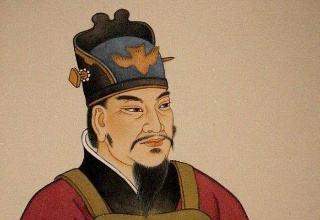
The prime minister was the supreme official who assisted the emperor and was in charge of state affairs in ancient times, and his position was very prominent. However, in the early Ming Dynasty, the Ming Emperor Zhu Yuanzhang abolished the post of chancellor and directly managed the six ministries by himself, and as a result, he was very busy, so he had to find some ministers as attendant advisers and give him the title of "Scholar of the Imperial Pavilion" to help him handle government affairs. When Ming Chengzu Zhu Di was in power, he formally established a "cabinet" with 3 to 7 cabinet members to participate in government affairs. Later, the status of the cabinet increased, and the six ministries almost became subordinate organs of the cabinet, and the cabinet scholars became the de facto prime minister. During the reign of Emperor Mingxianzong, Liu Jue was one of the three cabinet scholars at that time.
Many prime ministers in history have legends, and Liu Jue is no exception. Liu Jue was a native of Shouguang, Shandong, during the Ming Dynasty, born in the first year of Xuande (1426) of the Ming Dynasty, who was intelligent and studious since childhood, "born to be enlightened" and "recited by the eyes". The most peculiar thing is that Liu Jue was born with a word on his face. According to the "Epitaph of Liu Jue", Liu Jue's face "has a pattern of '丞' characters", and in his infancy, "there is an old man who knows: it is a child's face with a patterned '丞' character, and it will be a phase after that.". 丞, also known as The Minister of Finance and the Prime Minister, was referred to as a cabinet scholar during the Ming Dynasty. The Epitaph of Liu Jue was written by Liu Jue's contemporary Ming Dynasty official Shangshu Yin Min, so it is quite credible.
In the thirteenth year of orthodoxy (1448), Liu Jue passed the examination for the middle of the jinshi and began to enter the career path, starting from the Hanlin editing. During the reign of Emperor Yingzong of Ming, Liu Jue, because of his profound knowledge and outstanding character, was appointed by Emperor Yingzong to serve as the tutor of the crown prince Zhu Jianshen. After Zhu Jianshen ascended the throne, he was for Emperor Mingxianzong. As the emperor's teacher when he was crown prince, Liu Jue was naturally valued and constantly promoted. He first served as Tai Changqing, then promoted to the post of Zuo Shilang (左侍郎) of the Bureaucracy, and soon after he was promoted to Shangshu of the Bureaucracy, plus Prince Shaobao and Scholar of Wenyuange University.
In the eleventh year of Chenghua (1475), after Liu Jue was ordered to compile the Wenhua Grand Training, Emperor Xianzong further made Liu Jue the Crown Prince Taibao and a scholar of the Imperial Palace. At this point, Liu Jue finally became an extremely popular subject, and his status was equivalent to that of the prime minister.
Liu Jue was a person who was "sexually unruly", "thought that he was an old courtier of the palace, and had no protection in case of trouble", and was honest and outspoken, and had no taboos. At that time, there was a eunuch named Liang Fang, who was favored by Emperor Xianzong and often gave her rare treasures, so he was deeply favored by Wan Guifei and Emperor Xianzong. Liang Fang was corrupt and perverted the law, committed wrongdoing, and had no fear. Lin Jun, a member of the yuan, wrote a letter to impeach Liang Fang, but unexpectedly angered Emperor Xianzong and was sent to prison for punishment. Many ministers dared to be angry and did not dare to speak, but Liu Jue violated his words and tried his best to defend Lin Jun, and finally persuaded Xianzong to pardon Lin Jun.
In the middle and late Ming Dynasty, there was often a dispute over the "foundation of the country". The so-called "national foundation" is the crown prince. To fight for the "foundation of the country" is to solve the problem of who will be the prince. The eunuch Liang Fang, the traitorous minister Li Zisheng, and others "rebelled against the government and wanted to shake the Eastern Palace", and they slandered the crown prince Zhu Youfan and wanted to depose him. Liu Jue, believing that the crown prince was strict and serious, and that he was not at fault, resolutely opposed the shaking of the "foundation of the country", so he repeatedly advised Emperor Xianzong to expose the plots of Liang Fang, Li Zi province, and others, and preserved Zhu Youfan's position as crown prince. Later, Zhu Youfan successfully inherited the throne, that is, a generation of sages Ming Xiaozong.
At that time, there were three university scholars in the cabinet: Liu Jue, Wan An, and Liu Ji. The History of Ming commented on the three: "An is greedy and cunning, and Ji Yin is carved." Slightly superior, Gu Xitan theory, people are manic." This means that Wan An is greedy and cunning, Liu Ji is sinister and mean, while Liu Jue is much better, speaks without scruples, and is regarded as "manic". In fact, Liu Jue is not manic, but dares to speak out and refuses to follow the tide. Because of this, Liu Jue was at odds with Wan An, Liu Ji and others, and eventually under the exclusion and framing of these people, he could only choose to retreat.
In the third year of Hongzhi (1490), Liu Jue died of illness at the age of 65. Emperor Xiaozong had been protected by Liu Jue before he could ascend to the throne, so he had great respect for Liu Jue. After learning of Liu Jue's death, Emperor Xiaozong personally wrote the festival: "Loyal to the country, allowed to be called a generation of famous courtiers; filial piety in the township, can be the elder of the three dynasties." ”